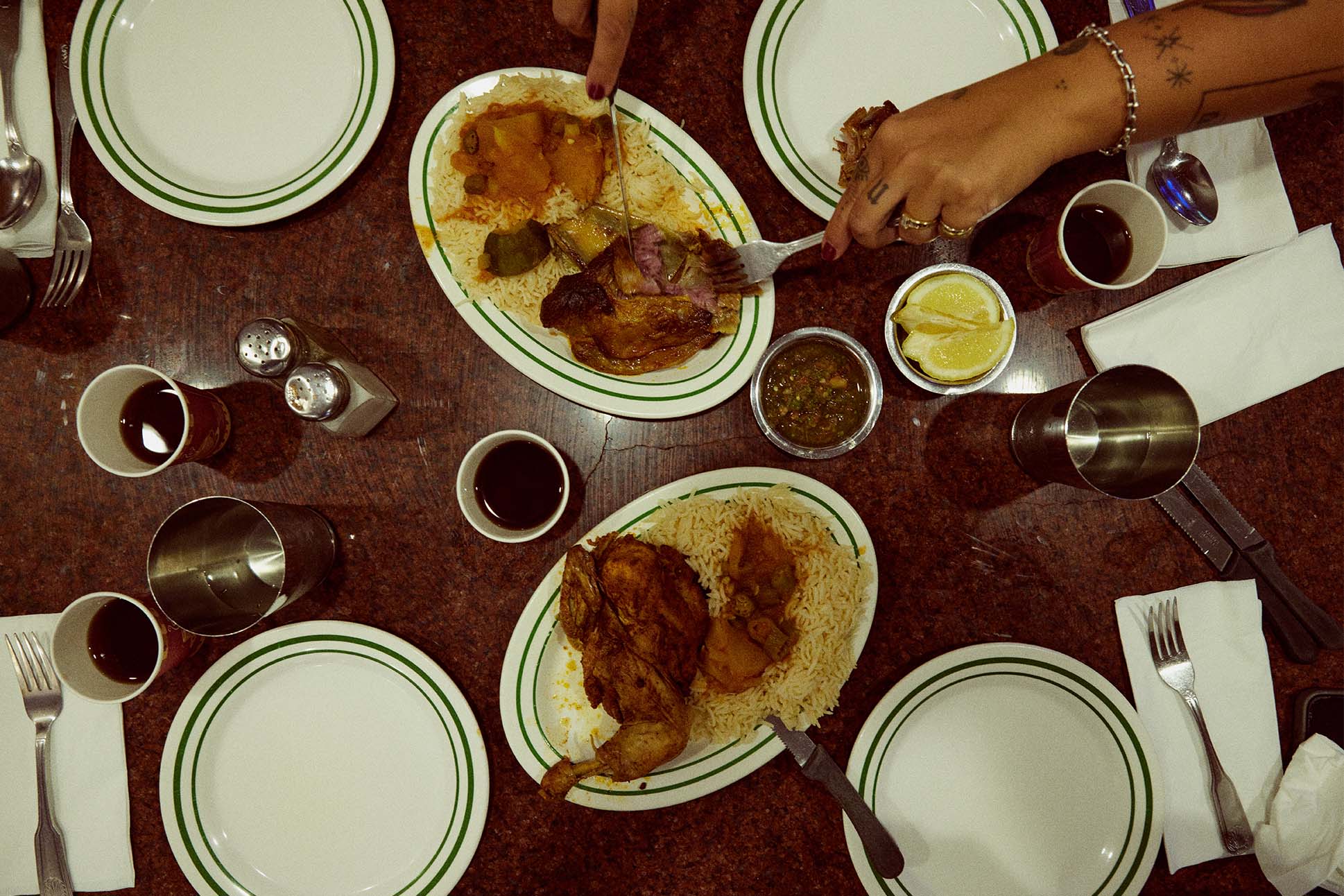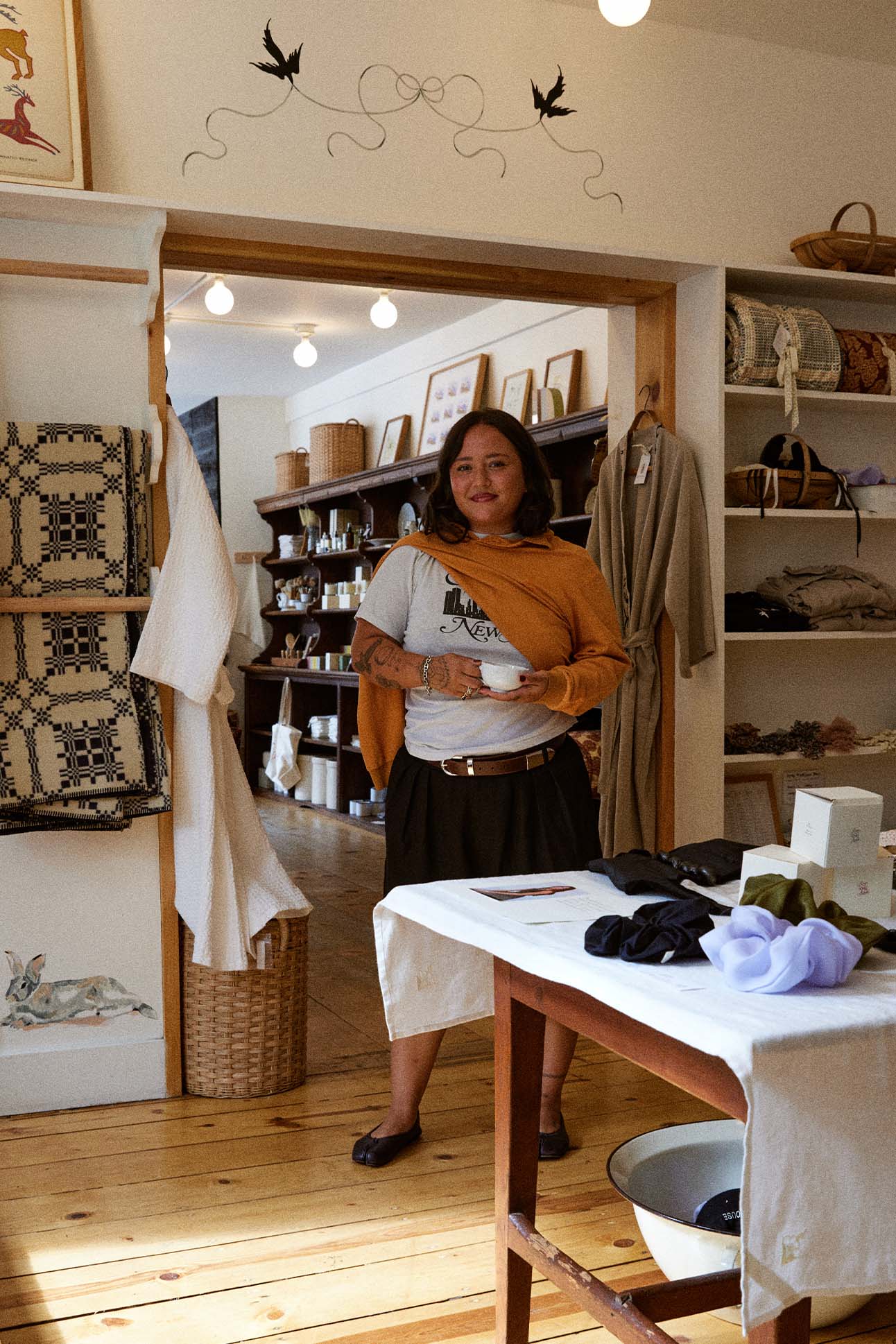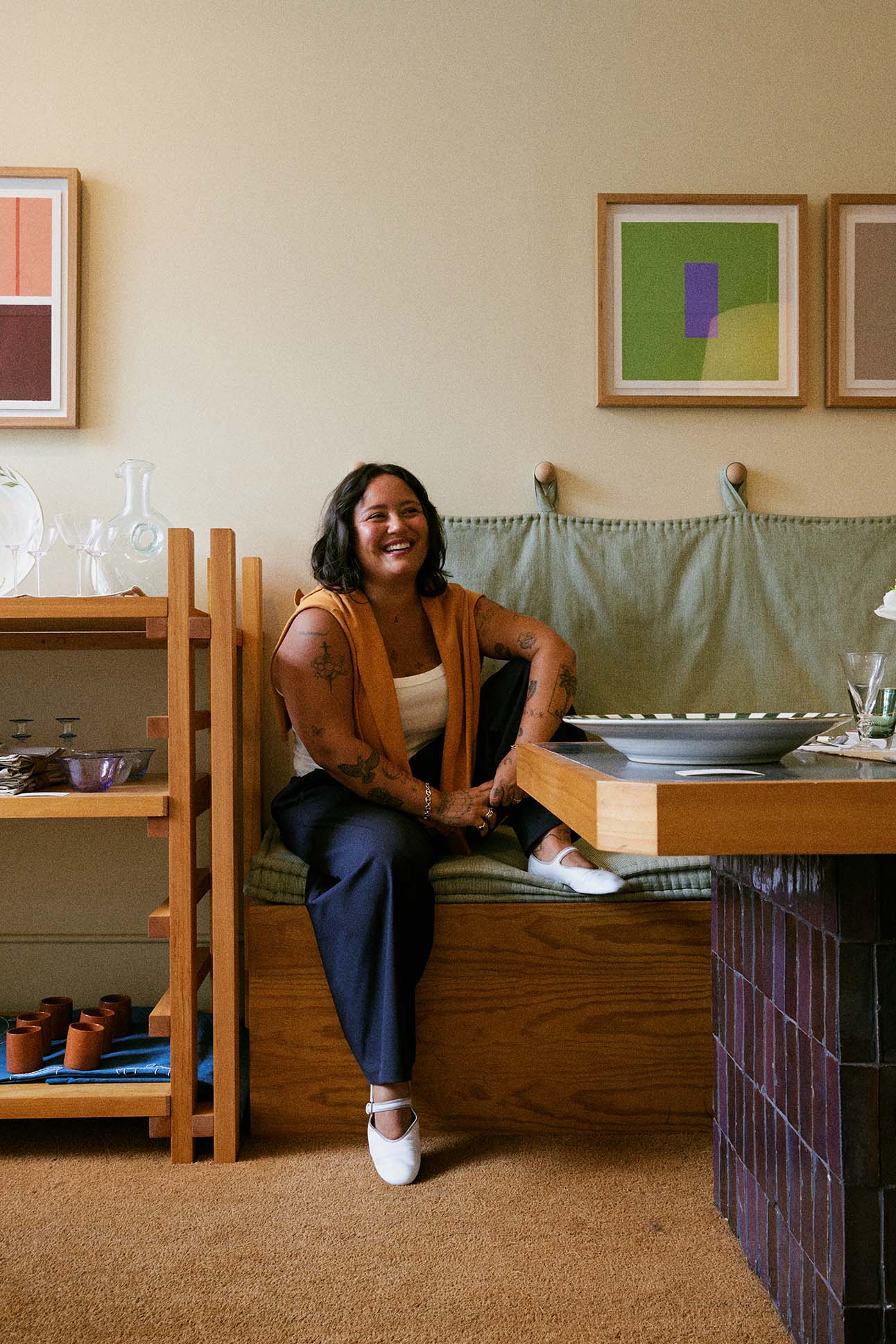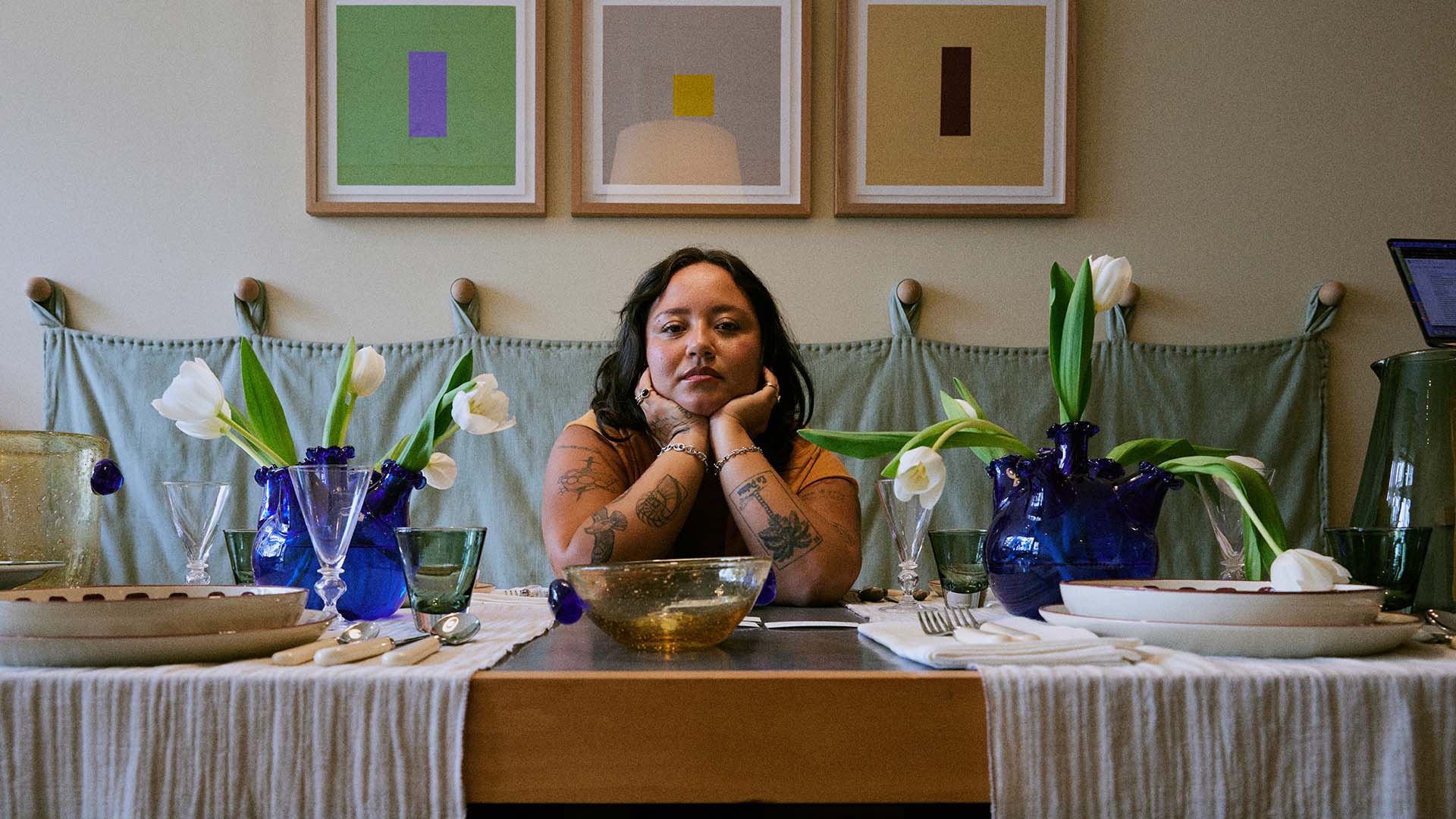Nadia Agsen finds inspiration in artisanal shops and middle eastern bites. But the key ingredients are always a sense of place and togetherness.
Images by Desmond Centro
Dinner was served on a bed of banana leaves. Fluffy mounds of white rice serpentined down the center, flanked by traditional Filipino fare: golden crisp lumpia; chicken inasal, a variant of the chicken dish lechon manok; tender pork belly adobo; and delicately sour daing na bangus, milkfish marinated in vinegar and fried. Not a plate nor a utensil was in sight. Instead, guests ate with their hands, plucking bits of food between sips of wine.
The feast served kamayan-style (Tagalog for “eating with one’s hands”) is among Nadia Agsen’s favorite dinners to cook under her New York supper club, Pica Pica. Since the club’s inception in 2022, the 30-year-old chef has produced multicourse meals with inspired interpretations of her childhood favorites like duck simmered in tart adobo marinade or chicken wings à la Jollibee Chickenjoy, seasoned with five-spice and lathered in gravy.
Though not all of her dinners are kamayan, the uniting thread is a sense of communion. Guests dine together at a communal table, strangers growing in propinquity over family-style courses. It’s an approach drawn from Agsen’s own Palestinian-Filipino upbringing, where she witnessed language and cultural barriers transcended in the kitchen, saying, “It’s like [my grandmothers] had this deep connection and admiration for each other without even knowing how to speak each other’s language.”
It’s an artistic drive to have the same love of palette that I had as a photographer and videographer now that I’m a chef.
Nadia Agsen
At 8 years old, Agsen and her family moved from Seattle to Hawaiʻi. No longer within proximity of her grandmothers’ cooking, Agsen took a keener interest in her family’s cuisine. Through her mother, she learned to cook the meals that her maternal grandmother served at her restaurant in the Philippines and the Palestinian recipes her paternal grandmother taught her mother.
Her Hawaiʻi upbringing, too, began to color her palate. Like any good local kid, she grew up on poke bowls and mixed plate lunches. Today, her dinners are characterized by a Pan-Asian mix of flavors influenced by her Filipino heritage and formative years in the islands. Though she admits that she is not as comfortable cooking Palestinian dishes as she would like, there is a library of recipe cards that her Teta, as she lovingly calls her paternal grandmother, handed down to her mother. “It’s something that I want to experiment with and expand on learning more,”
she says.

In inviting guests to partake in a meal with perfect strangers, Agsen is looking to curate that same sense of kinship, particularly after how isolating the pandemic was for New Yorkers. As they eat from the same mound of rice or pick apart a whole fish together, Agsen hopes that the intimacy begets meaningful conversation and authentic connections. “You’re disarmed when you’re doing something you practice everyday,” she says. “And obviously, we all have to eat.”
Here, Agsen takes us on a tour of Brooklyn’s Little Syria. The following are edited excerpts from our interview about the neighborhood people and places who most nourish her creativity.
Tea Time
My job is super physical and taxing, whatever the opposite of glamorous is. So, I like to have slow mornings on my days off. I’ll probably head down to Salter House around lunchtime. They’re family-owned and they have so many sweet things there. Sometimes I’ll stop by Woolyn to buy the yarn that I knit with — it’s just another way for me to exercise movement with my hands outside of my work. I’ll take whatever knitting project I have with me to Salter House, get a big pot of a local tea they specialize in, and just hang out there. They’re also a home shop, so if I have dinnerware I need to restock on or just looking for cute decor for the house, I’ll get it there. I recently bought some quilted napkins from their collaboration with O Angel, a Korean homeware brand by the art studio 92% Angel. I use them as coasters for the Salter House teas I have at home.
Picture This
Connected to Salter House is a really beautiful place called Picture Room. They host an array of beautiful art in so many mediums. But I really love their photography pieces. I originally moved to New York to be in production. From middle school on, I studied photography and videography. Back in Honolulu, a friend and I had a tiny production company where we covered chefs and their practice. That was my first crossover between food and film.

With my work at Pica Pica, I look at my plates in colors. I make sure I have a diverse array. If I see a photo I really like at Picture Room, I might take a picture of it, then use it as an idea for my next plate. But the most recent work that has influenced me is actually a series of lamps by Ana Louisa Corrigan. The collection was an ode to her mother who had passed away. The way that she was able to pull nostalgia into creating a lamp and a physical space was so beautiful. It helped me think about my practice and how to pull specific moments with my mom and grandmothers and how to have that translate onto a plate.
I also felt inspired by her being so vulnerable with her mom. I recently did a mutual aid event for Palestine at the People’s Forum in Midtown. I don’t cook Palestinian food for the public for vulnerability reasons. Since my mom is the first person who trained me in the kitchen, I’m more familiar with Filipino food. I’ve definitely had hard discussions and associations with being Palestinian. But seeing Corrigan be vulnerable with her story gave me the courage to say, “It’s okay, I can be vulnerable and cook Palestinian food,” and to lean into the uncomfortable spaces in my practice.
A Historic Outpost
Sahadi’s is a Lebanese grocery store that first opened in 1895, back when Little Syria was originally in Lower Manhattan. When they began building the World Trade Center, they wiped the entire neighborhood out. The community moved to South Brooklyn and one of the shops was Sahadi’s.
It’s where I get all my spices from, whether for work or for my personal kitchen. They sell spices in bulk imported from the Middle East, specifically Lebanon. For Pica Pica, I mainly cook Filipino dishes, since it’s the recipes I’m most familiar with. But when I do cook Palestinian food at home, I go to Sahadi’s to get all the ingredients. I always feel like I need to have baharat, which is Arabic five spice. At Sahadi’s, I’ll make my own blend by buying all of the separate spices: paprika, black pepper, cumin, coriander, cinnamon, clove, cardamom, star anise and nutmeg. I’ll also buy a quick snack, usually this delicious Palestinian-Lebanese-Syrian pastry called fatayer.

Comfort Foods
At Damascus Bread and Pastry, there’s this old Baba who is there all day, Monday through Sunday. They have the most delicious pistachio bird’s nest. It’s a flaky pastry, dipped in syrup and topped with crumbly pistachios. They also sell their own bread, lavash, and saj — just a bunch of goods that you can take home.
Across Damascus is Yemen Cafe. It’s probably my favorite place to get a really good Arabic meal. I didn’t grow up having Yemeni food, but the technique they cook with really reminds me of Palestinian food. It’s all very homey to me. On my days off, I like to have nostalgic, comforting food because I’m usually tired or emotionally exhausted. There’s a chicken dish that they stew, similar to the Moroccan dish tagine. It’s a lot of turmeric and a lot of spices. Then there’s this lamb dish, a full shank, that they cook for six hours and it just falls off the bone. But what I really love is that they serve all of their meals with a little soup broth and a tiny serving of jalapeno relish. The jalapeno relish reminds me of what my Teta used to cook.
It’s nice in there because it’s usually just uncles and aunties, families having a nice little sit down. It’s comforting to be around that for me. There’s something about being surrounded by Filipino aunties or Arab aunties and uncles that make me feel safe and comforted.

For the Home
Almost all of Porta’s products are sourced from Italy. They have the most beautiful table linens, dinnerware, candelabras — anything you can think of for a kitchen or dining space, they have. Because everything is ceramic from Italy, it’s just so beautiful.There’s this beautiful hand-painted fish plate that, no matter the occasion, I’m using. I also have these cute radicchio rosa salt and pepper shakers that my mother bought us for a housewarming gift.
The owner has such a specific eye. He handpicks a lot of these things from small artisans in Italy. He is so fantastic with colors. I’m a really color-driven person. Any filmmaker will tell you they stick to a color palette, whether it’s a hue of color grading while they’re editing or the physical colors they use in costuming and on set. That definitely informs my practice. I always make sure my plates have a pop of color or different colors. It’s an artistic drive to have the same love of palette that I had as a photographer and videographer now that I’m a chef.
Nadia’s Guide to Little Syria
All located in Brooklyn, New York
Woolyn
105 Atlantic Avenue
Salter House
119 Atlantic Avenue Picture
Room
117 Atlantic Avenue
Sahadi’s
187 Atlantic Avenue
Damascus Bread and Pastry
195 Atlantic Avenue
Yemen Cafe
176 Atlantic Avenue
Porta
360 Atlantic Avenue

